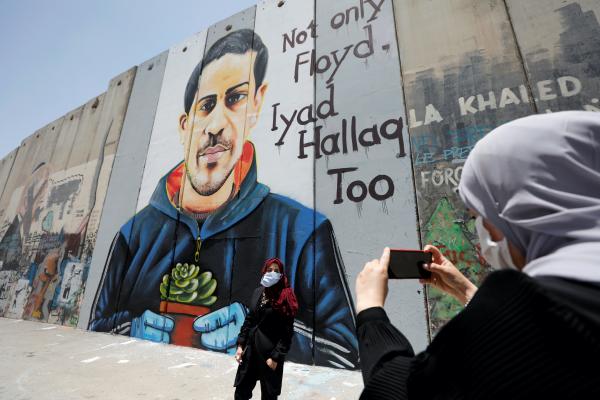Every day Iyad Halaq walked 10 minutes from his home in East Jerusalem to the Elwyn El Quds Center in the Old City, a school serving those with disabilities. Halaq was autistic and had difficulties with communication. On Saturday, May 30, two Israeli police thought he was carrying a pistol. Apparently, he didn’t understand their order to stop. The police pursued him and shot him twice, in the chest. Of course, Halaq was unarmed.
In protests by Palestinians and Israelis that followed in Jerusalem, Tel Aviv, Jaffa, and the occupied West Bank, parallels were drawn to the killing of George Floyd. Many chanted “Palestinian Lives Matter.” Artist Taqi Spateen painted murals on the separation wall built by Israel, weaving through the border with the West Bank, with portraits side by side of George Floyd and Iyad Halaq. Spateen says, “Both were killed by the arrogance of racism.”
The United States is facing a pivotal moment of racial reckoning. Effective movements for social justice must maintain a singular focus, preserve memory, and lengthen the collective attention span of the society. Yet racial and political injustice continues its steady march throughout the globe, with flashpoints that must not be ignored. Protests are responding to a criminal common ground unearthed in the killing of George Floyd and so many others remembered in the chants of “Black Lives Matter.”
The killing of Iyad Halaq came after Israeli Prime Minister Benjamin Netanyahu announced his intention to annex up to 30 percent of territory in the West Bank. In May 1967, not a single Israeli lived in the West Bank. Following Israel’s victory in the Six Day War that June, a push toward building Israeli settlements in the region started. When the settlement building began, Israel said that they would not be permanent.
Today, 121 official settlements are planted throughout the West Bank, with about an equal number of unofficial “outposts.” More are in East Jerusalem. About 650,000 Israeli settlers reside in these areas, which are linked together by an infrastructure of protected roads and claims on water rights. This has become an immovable force in contemporary Israeli politics.
The occupation of the West Bank and the building of these settlements has been judged illegal by the International Court of Justice, the United Nations, and most of the international community. The United States is the primary exception. While U.S. administrations since 1970 have objected to the growth of Israeli settlements, no serious consequences were imposed. Settlements grew. Then the Trump administration declared officially in 2019 that the settlements “were not inconsistent with international law.”
The growth of Israeli settlements has constituted an implicit, de facto annexation of this territory. Now Netanyahu’s proposals would make this official, or de jure, for various areas. Many European countries have voiced strong opposition, echoing most of the international community. Global Christian organizations such as the World Council of Churches, the World Communion of Reformed Churches, the Lutheran World Federation, Anglican Archbishop Justin Welby (the Archbishop of Canterbury), the World Evangelical Alliance, church leaders in Bethlehem, and many more have been forcefully vocal in their protest. But the voice that matters most to Israel is that of the United States.
Most observers contend that a further move toward any annexation would be the final nail in the coffin of any “two-state” solution to the Israeli-Palestinian conflict. Many say that option is already dead. A case can be made that from the beginning, the Likud Party and others promoting settlements desired to undermine the viability of a Palestinian state by establishing these “facts on the ground.”
But a “one state” solution raises a fundamental dilemma for Israel. If such a state were truly democratic, with equal rights for all, the distinctively Jewish character of Israel, so essential to its identity and role for the Jewish people, would be curtailed. Maintaining that identity, however, would necessitate enforcing unequal citizenship, causing many to warn of similarities to apartheid.
The tangled web of some U.S. and international evangelical and Pentecostal leaders blessing Israel’s expansionist ambitions toward the West Bank and more has a long and complicated history. President Trump has wrapped his political arms around those religious allies today in a craven attempt to preserve his evangelical base. But other Christians – including many prominent evangelicals – have consistently refused to condone Israeli occupation of Palestinian land as a supposedly “biblically sanctioned” real estate plan.
In 1979, the La Grange Declaration was written by a group of prominent Christians rejecting “Christian Zionism” and stating, in part, that since the Six Day War, “large portions of the Holy Land and its people, including the West Bank of the Jordon River, Gaza, and East Jerusalem, have suffered under foreign military occupation, even as in our Lord’s time ... we confess our silence, our indifference, our hard-heartedness, and our cowardice, all too often, in the face of these dehumanizing realities.” It made a plea for recognizing Palestinian human and political rights in the search for peace, while affirming Israel’s statehood. Eventually 5,000 Christian leaders signed the La Grange Declaration, a second version of which Sojourners published in 1981.
In 2002, a group of 58 well-known and influential evangelical leaders wrote a letter to President George Bush urging an “even-handed” approach to Middle East peace and asking him to provide leadership by “vigorously opposing injustice, including the continued unlawful and degrading Israeli settlement movement. The theft of Palestinian land and destruction of Palestinian homes and fields is surely one of the major causes of the strife that has resulted in terrorism and the loss of so many Israeli and Palestinian lives. The continued Israeli military occupation that daily humiliates ordinary Palestinians is also having disastrous effects on the Israeli soul.”
Such voices are clearly needed in this hour. President Trump cannot go unchecked in trying to sprinkle evangelical holy water on Netanyahu’s illegal plans to annex any portion of the West Bank. But it is essential that those voices of opposition to Christian Zionism are just as stalwart in the opposition to all form of anti-Semitism. That’s been true ever since the La Grange Declaration and before. The profound hope of the Jewish people for an identity linked to the State of Israel must never be equated with the policies and practices of its present government to illegally annex territory that is not its own.
In the end, Prime Minister Netanyahu may agree to annex only 10 percent, rather than 30 percent, of territory, an attempt to appear to be “reasonable.” But that will only be the latest step in a policy that has been unreasonable, unlawful, and unjust for more than 50 years.
Like white allies to the Black Lives Matter movement in the U.S., many Israelis joined in the protests against the killing of Iyad Halaq. The question now, however, is whether Christian voices will confront President Trump’s tacit blessing of Netanyahu’s illegal annexation plans by declaring that Palestinian Lives Matter.
Got something to say about what you're reading? We value your feedback!






